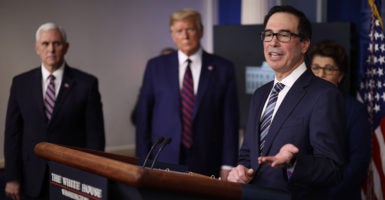Small businesses will be able to access new loans starting Friday to help them stay afloat during the economic crisis wrought by the coronavirus.
The $2.2 trillion coronavirus relief bill passed by Congress and signed by President Donald Trump established a $350 billion Paycheck Protection Program.
“This relief will help stabilize the small business sector by providing businesses with the financial resources they need to keep their workers employed and keep up with their day-to-day operating expenses,” Jovita Carranza, administrator of the Small Business Administration, said Thursday evening at the White House press briefing.
“The Paycheck Protection Program is to help keep employees on payroll and small businesses open,” Carranza said.
Under the program established by the Coronavirus Aid, Relief and Economic Securities Act, or CARES Act, private banks will make loans backed by the Small Businesses Administration for employers with 500 or fewer employees.
The size of the loan would equal 250% of an employer’s average monthly payroll. The maximum loan amount would be $10 million, with interest rates capped at 4%.
If the borrower uses the loan only to maintain payroll, cover the cost of interest on mortgage obligations, rent, and utilities, then the principal on the loan will be forgiven. So the employer would pay back only the interest.
Trump noted during the briefing that he had tested negative for the coronavirus for the second time. He used the so-called Abbott test, which shows results in five to 15 minutes.
“It took me literally a minute to take it. I guess it was 14 or 15 minutes [to get results]. I went to work. I didn’t wait for it,” Trump said.
“It said the president tested negative for COVID-19. So that’s the second one. I think I took it really out of curiosity, to see how quickly it worked and fast it worked. And it’s a lot easier. I’ve done them both, and the second one is much more pleasant.”
Treasury Secretary Steven Mnuchin announced that the first direct cash payments to Americans, $1,200, would be going out in two weeks instead of three weeks.
Trump trade adviser Peter Navarro, who the president named to coordinate use of the Defense Production Act, said that the administration is going to crack down on hoarders and profiteers, especially involving medical supplies.
“There’s a black market springing up. That’s gotta stop,” Navarro said.
Earlier Thursday, House Speaker Nancy Pelosi, D-Calif., announced that she was establishing a select committee to oversee the Trump administration’s relief programs.
“I am announcing the formation of a special bipartisan oversight panel: the House Select Committee on the Coronavirus Crisis, to be chaired by Majority Whip Jim Clyburn,” Pelosi said in a letter to colleagues. “Its purpose is to ensure that the over $2 trillion that Congress has dedicated to this battle—and any additional funds Congress provides in future legislation—are spent wisely and effectively.”
Mnuchin said he didn’t believe the select committee is neccessary.
“Both parties wanted us to have oversight, transparency; we have full transparency,” Mnuchin said of the administration’s approach. “We have an oversight committee. The [House] speaker gets to pick someone. The [Senate] leader gets to pick someone. We support full transparency. Taxpayers should understand how we are going to support this economy and jobs.”
Later, Trump mentioned partisan investigations without specifying Pelosi’s new select panel.
“This is not the time for politics, endless partisan investigations. Here we go again,” Trump said, adding:
Conducting these partisan investigations in the middle of a pandemic is a really big waste of vital resources, time, attention. We want to fight for American lives, not waste time and build up my poll numbers. Because that’s all they’re doing, because everyone knows it’s ridiculous.































